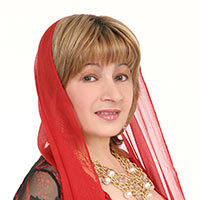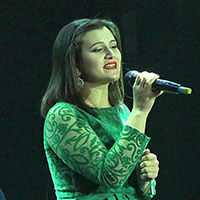Черкесский свадебный (Çerkes Düğünü) 2022 320kbps
Tracklist:
Черим Нахушев
Адыгэ
нысэ Невеста
5:01
Азамат
Биштов
Си
гугъапlэ
Tracklist:
Черим Нахушев
Адыгэ
нысэ Невеста
5:01
Азамат
Биштов
Си
гугъапlэ
1. Бетал
Иванов-Къэбэрдей (Кабарда)
2. Магамет
Дзыбов-12
3. Азамат
Беков, Рената Бесланеева-Си адэ
4. Адыгские
звезды-У адыгов обычай такой
5. Бетал
Иванов-Бацэ цlыкlу
6. Рустам
Нахушев-Адыги
7. Эдуард
Жигунов-Уэлджырхэ я къафэ Кафа Вологировых
8. Черим Нахушев-Бэрэ фытхуэпсэу
Albümde 8 beste yer
alıyor ve her biri birer kısa hikaye, geleneksel mirasın bir parçası.
Natella'dan şarkılardaki hikayelerini bizimle paylaşmasını istedik.
“Bu şarkıları seviyorum, onları çok
besliyorum. Her biri ruhumun bir parçası ve hayatımdaki en önemli şeyin
hatırası” diyor Natella, ““Abazaşta” (“Abaza Gelenekleri”) şarkısı Abaza
geleneklerini, bir gelinin ne kadar güzel evli olduğunu ve bir gelinin ne kadar
güzel bir şekilde evlendiğini söylüyor. Onunla yeni bir ailede ne sıcaklıkla
tanışıyor. “Amyz - Amyz” (“My Moon”), aydan sevgilisinin yolunu bulmasına
yardım etmesini isteyen bir kız hakkında bir şarkı.
“Akhvlapyn gIatali”
(“Gece geldi”), geceleri İnjiç-Çukun Nehri kıyısında yorulmadan kocasını
bekleyen bir kızın hüzünlü hikayesini anlatıyor. Gecelerin kocasının
ihanetlerinin sırlarını sakladığını bilmiyordu ve buna sadece ay tanıktı.
“Gvym lokt rychkIvynchva” (“Arkadaşlarım”) - burada arkadaşlarım hakkında, Krasny Vostok köyündeki çocukluğum hakkında söylenir. Bu şarkıyı onlara adıyorum, anılar ve iyi dileklerle dolu.
2020 yapımı bu albümde Kafkasya'daki milletlere ait Lezginka müzikleri derlenmiş.
Tracklist:
1. Дагестанская
лезгинка
2. Новая грузинская
лезгинка
3. Танец джигита
Ramzan Paskaev enstrümantal bir albüm çıkardı.
Enstrümantal proje "Ruhun Uyumu", Çeçen müzisyen ve besteci Ramzan Paskaev tarafından sunuldu. Albümde yer alan on üç beste, hem modern hem de klasik seste tasarlanmış geleneksel Kafkas motiflerini özümsemiştir. Melodilerin çoğu bizzat Ramzan tarafından yazılmıştır. “En az bir kez görüşürüz” kompozisyonunun yazarı Umar Dimaev'dir.
Albümde yer alan on dört şarkı hayattan hikayeler anlatıyor, vatan ve insan sevgisini yüceltiyor. Kompozisyonlar, Tamara Dadasheva, Maxim Temirsultanov, Abu Eldarkhanov ve Movsar Magomadov'un yaratıcı birlikteliğinde yazılmıştır.

“Öncelikle dinleyicilere şarkılarımın her satırından ve notasından keyif almalarını diliyorum, tüm çalışmalarım onlar için” diyen Tamara, “bu albümde farklı şarkılar var: duygulu, komik, düet. Ve her birinin yaratılışına yatırılan duygusallık ile birleşirler. Kendim için "San Dog" (Kalbim) şarkısını seçiyorum, adı kendisi için konuşuyor. "
Tamara Dadasheva'nın yeni albümü - "Haza denosh"
çıktı.
Proje, büyük çoğunluğu sanatçının kendisine ait olan on üç
kompozisyon içeriyor. Shaid Rashidov, Movsar Magomadov ve Abu Edelkhanova da
albümün oluşturulmasına katkıda bulundu.
Bu albüm hem çok sevilen şarkıları hem de birkaç yeni ürünü
içeriyor. Umarım dinleyicim de yeni şarkıları sıcak bir şekilde kabul eder!
Belirli bir işi seçip ayırmak benim için her zaman zordur. Her şarkı, belirli
bir dinleyiciye uyan bir hikâye ve bu onların güzelliğidir.
Bu albümün adı "Haza denosh", yani "Neşeli günler". Benim için her gün sahnede, gelecekte memnun etmek istediğim minnettar bir izleyiciyle tanıştığımda! ”, Diye paylaştı Tamara.
Deni Satabaev "Kafkasya" projesini sundu.
Çeçen besteci ve müzisyen Deni Satabaev'in yeni albümü, kendisine "Kafkasya" adını veren dağlık bölge kadar derin ve çok yönlü. İçinde yanan lezginka, oryantal motifler ve hatta elektronik müzik unsurları ile narin, lirik piyano melodileri bulunur. Albümün on iki kompozisyonu Denis tarafından yazıldı ve Ibragim Chuchaev "Khetakhya soh" ("İnan bana") eserini yazdı.
1. Бетал Иванов Бацэ цlыкlу
2. Амур Успаев Суперлезгинка
3. Алла Бойченко, Рами Дарока Гандагана
4. Рами Дарока Джэгу
5. Руслан Катчиев Abezek
Eduard Zhigunov enstrümantal müzikten oluşan bir albüm
çıkardı.
Adyghe enstrümantal bestelerinden oluşan "Gum k'ilukl pshynal'e" ("Melodies of the Soul") albümünün galası Kabardey besteci ve yorumcu tarafından sunuldu. Eduard Zhigunov... Proje, çoğu eski halk ezgilerinin notalarını taşıyan altı eserden oluşuyor.
Bu parçaların hepsini çok seveceksiniz. Bu besteler, Adıge
halkının kültürünü ve Kabardey mızıkasının uyumunu birleştirir.
Herkese mutlu dinlemeler! Ruhum seninle ve senin için
oynuyorum! Kalbinizde her zaman sadece neşeli "Ruhun Melodileri"
sesinin duyulmasına izin verin, - diye diledi Edward.
1. Адыгейский Исламей
2. Адыгский княжеский танец
3. Гъатхэ Къафэ (Весна)
Albert Teunikov solo mini albümü "Gukeklyzh" - "Anma" nın galasını sundu. Albümde geleneksel Adıge tarzında icra edilen 4 enstrümantal beste yer alıyor.

Diana Apsova, "Abazino-Adyghe tunes" adlı mini bir albüm olan uzun zamandır beklenen yeniliği tanıttı. Her biri kendi hikayesine sahip dört güzel kompozisyon içeriyordu. Şarkıcı bunu daha ayrıntılı olarak açıkladı:

Circassian and Abkhazian music from Turkey
This is the second release from the Xexes series in which we
publish music of the Circassian diaspora in Turkey
Initially, we were not going to Eskişehir. The city was on our way from Kayseri
to Ankara, but we did not expect to meet performers there. Fortunately, various
informants told us about Chaglan Chatao. He collects songs, sings, plays the
accordion and even the shichepshin — an authentic Circassian violin. And this
was not about a senior person, but about a young enthusiast and musician —
Chaglan was born in 1986.
Chatao met us in Eskişehir and took us to his native village of Hakurinohable
(the official Turkish name is Oklubali) for recording. A village of the same
name resides in Adygea — we did a record there for our release featuring
religious songs. Immigrants from the original village founded Turkish
Hakurinohable.
Already in Eskişehir, it became clear that Chaglan was a local DIY
ethnographer. He has made his collection communicating with his elders, going
on expeditions to the nearest villages, and attending folk festivals. The most
peculiar part is that he focused on the folklore of the Circassians living in
the Eskişehir region: songs, stories, and local versions of dance tunes.
It was easy to work with Chaglan. He viewed us not only as guests from his
original homeland but also as like-minded people. We didn't even have to
explain anything: he just gathered the friends with whom he usually sings. In
addition to Chaglan, the permanent members of the group include Lutfi Ferhatuko
and Bakhtiar Nakhush. The Hakurinohable trio has no name because the guys do
not perceive themselves as artists. They are interested in the preservation and
continuity of their native tradition. And yet, in 2013, the group released a CD
(or just a homemade CDR, it's hard to check) — "Hakurinohable
pshynaleher", featuring the village dance tunes. The record is remarkable
but too sterile and smooth for our taste.
You may get it here: kavkazmusic.blogspot.com/2018/12/mzka-havalar-eskisehir-oklubal-koyu.html
Our release turned out to be rawer and more vibrant in sound and atmosphere. In
addition to the same dance tunes one may usually hear at weddings, we have
recorded several other songs. These are mostly household and love songs that
originated in Hakurinohable. It is remarkable that the residents of the
village, who remember their culture, homeland, and forced exile, do not sing
songs from the time of the Russian-Caucasian War. Chaglan Chatao was also
curious about it, so he tried to record songs of lament or heroic ballads, well
known to the Circassians of the Caucasus. But the older generation of Eskişehir
district had forgotten songs of that time on purpose because it was too painful
to sing about the deportation. “We don't want to experience these things again,
even in songs,” they said.
We think that this must be an indicator that music had remained an important
element of everyday life for the Ottoman Circassians, since some topics were so
traumatically perceived. At the same time, the tradition was constantly
developing, changing and acquiring new contexts.
1. 1. Уарзета
2. 2. Уалдзаги райгъал
3. 3. Куырттатаг усгур (feat. Вероника Цугкиева)
4. 4. Ирыстон
5. 5. Анарай фауай
6. 6. Мабал ма сайа
1.
Zyrauek 03:42
2.
Zhansuret i gyubze 03:38
3.
Father 04:15
4.
Kavkaz 03:03
ABOUT THE ALBUM
1 disc(s) - 4 track(s)
Total length: 00:14:38
Main artist: Karina Dogova
Composer: Various Composers
Label: Kavkaz Music по лицензии ZvukM
Genre: Wereldmuziek
Jrpjej is the main project, produced by the label. This
isn’t music recorded in an expedition, but the result of many days of
rehearsals, investigations, and live performances.
Since the release of the debut album, a lot of things have
happened with Jrpjej. First, due to the pandemic we canceled the European tour.
Then two members left the band, including the main vocalist Beabars Appesh.
After the upheavals the quartet turned into a trio: the founder of the group
Timur Kodzoko, the harmonica player Alan Shawdjan, who also took on all the
male vocal parts, and the new vocalist Daiana Kulova.
Perhaps, the stress and new challenges allowed us to get
together and find the right sound shortly. On the one hand, it continues the
aesthetics of “Qorror”, and on the other, allows us to say something new.
Something new here is a more persistent commitment to the
idea of “post-traditional music”. On “Taboo”, in addition to guitar and
percussion, such atypical for Circassian music instruments as the cello and
German bagpipes appeared.
The songs for the album are taken from archival recordings
of the 20th century and from Ored Recordings' expeditions. Some are performed
close to the original, others are changed dramatically.
The goal of this reconceptualization is not to give old
songs a new life, to modernize, but to play them as we want. This brings Jrpjej
closer to the masters of the past: most of the musicians whose recordings have
become classics of traditional music have their recognizable style and unique
sound. Magamet Khagauj, Aslanbek Chich, Khajdal Kunizhev, and other narrators
of folk tales and instrumentalists of the 20th century did not reconstruct the
songs of bygone antiquity, but each time created Circassian music based on
tradition, aesthetics, and canons. A group that has just begun to discover its
native music can not be put in one next to the famous djeguako, but the
principle is the same.
The band’s main lineup made the album coherent, but the
invited musicians diversified the release and added their touches.
Tamerlan Vasiliev from the first lineup of Jrpjej returned
to help with the flute parts — kamyl, apapshina (Circassian dombra), and
shichepshin (fiddle).
Aslan Tashu, who also has a solo project Azmetuko, not only
sang along and played along in several songs but also soloed in
"Karakamyl". His friend Dzhambulat Tlemshok, an aspiring journalist
and beatmaker, helped with the background music in several songs.
Perhaps Jrpjej becomes not a group, but a community in which musicians experiment and make their own music, getting a place and means for creativity.